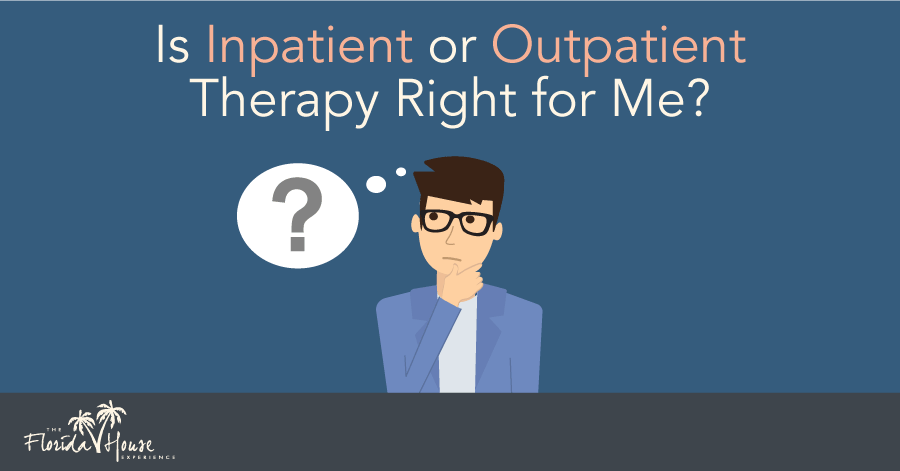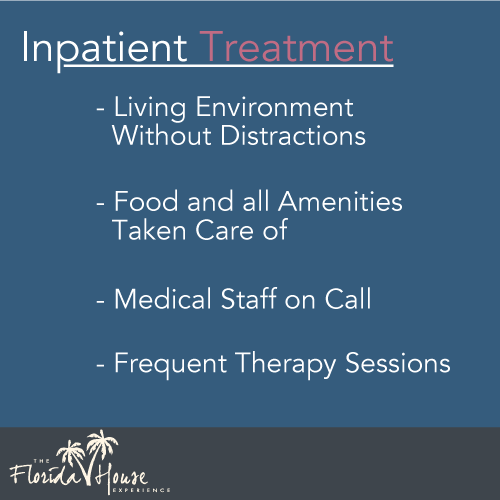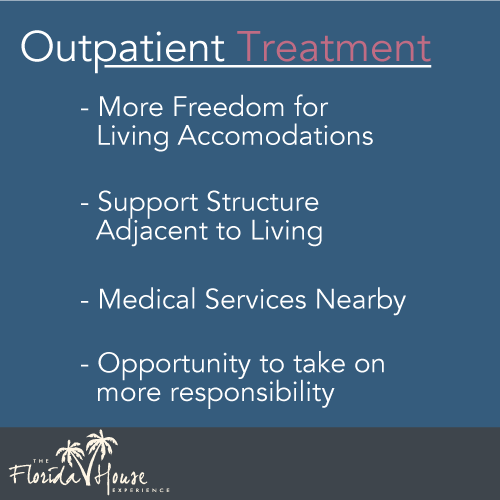
When you’re seeking help for addiction, one of the biggest choices is between a residential inpatient program or getting outpatient care. Comparing the pros and cons of each option can help you find the right program for your needs.
What Is the Difference Between Inpatient and Outpatient Care?
 The main difference between inpatient and outpatient care is where you access treatment. In an inpatient program, you live at a rehab facility full time while you undergo therapy. With a traditional outpatient program, you live at home and go to regular treatment sessions over a few weeks or months. FHE Health offers another alternative: an intensive outpatient care option. Participants live and attend therapy sessions at the rehab facility but can go to work or school during the weekdays.
The main difference between inpatient and outpatient care is where you access treatment. In an inpatient program, you live at a rehab facility full time while you undergo therapy. With a traditional outpatient program, you live at home and go to regular treatment sessions over a few weeks or months. FHE Health offers another alternative: an intensive outpatient care option. Participants live and attend therapy sessions at the rehab facility but can go to work or school during the weekdays.
Inpatient facilities are tailored to put the focus entirely on recovery. They provide a calm, supportive environment without any distractions. Food, sleeping arrangements and leisure time activities are provided. The resident doesn’t have to worry about any of the details of daily living. Staff is on-call day and night to help with any issues you might encounter.
 Outpatient programs aren’t as structured. Recovery is scheduled around other daily activities. While this flexibility and freedom works for some people, it can be too distracting for others. Exposure to the stresses that triggered substance abuse in the first place can make it hard to stay sober. Access to drugs or alcohol can sometimes be too much of a temptation during the early phases of recovery.
Outpatient programs aren’t as structured. Recovery is scheduled around other daily activities. While this flexibility and freedom works for some people, it can be too distracting for others. Exposure to the stresses that triggered substance abuse in the first place can make it hard to stay sober. Access to drugs or alcohol can sometimes be too much of a temptation during the early phases of recovery.
Both kinds of care use a combination of therapy, peer group counseling, and behavioral strategy lessons. The objective is to teach you how to prevent future relapses. Programs of both types may also include family counseling or specialized options tailored to your specific needs. For dedicated medical care and help with the detoxification process, you need an inpatient program.
Recovery is a lifelong process, so a combination of programs could work as a long-term strategy. Many people start the journey to recovery in an inpatient facility and then transition to an aftercare outpatient program. This can be a way to ease back into regular activities while keeping the focus on preventing relapses and maintaining sobriety.
Inpatient Vs Outpatient Therapy Outcomes
In general, outcomes tend to be better for people who enter an inpatient treatment program compared to those who only use a non-intensive outpatient program. More people tend to quit outpatient programs early in their treatment. Individuals in an inpatient setting may find it easier to maintain commitment. There are no distractions from everyday life to derail their progress. The exception is intensive outpatient programs: they have a success rate similar to inpatient programs.
One major thing that affects outcomes is continued care after the initial program is complete. Having outpatient therapy or peer group meetings as part of your aftercare plan can boost your chances of long-term success. Keep in mind that relapses aren’t necessarily a sign of failure during recovery. A relapse could be an indication that you need to change your program or move into a more intensive type of recovery for a while.
Pursuing Mental Health Care and Addiction Care on an Inpatient Vs Outpatient Basis
Many people who pursue treatment for substance abuse and addiction also have confounding conditions that complicate recovery. In some cases, this includes multiple addictions that need to be treated simultaneously. In other cases, the individual seeking treatment may have mental health issues that need to be addressed along with substance abuse. Anxiety, bipolar disorder, depression or schizophrenia may need specialized treatment before successful substance abuse recovery is possible.
In general, inpatient facilities can handle multiple issues during recovery better than outpatient programs. The dedicated staff and calming environment provide a good base for discovering and addressing any confounding problems. Inpatient facilities have medical doctors, psychiatrists, nurses and therapists on staff to ensure that each resident gets the care they need.
Important Considerations for Deciding on an Addiction Treatment Program
Before you can determine which is right for you, make a careful assessment of your specific circumstances. Every addiction is different. Seek out a program that offers an individualized plan tailored to your needs.
If you need medical detox or an intensive focus on your recovery, you may have to check into a rehab facility for at least a few weeks before trying other options. Going through detoxification, the first step toward freedom, is extremely hard to do on your own. Around 80 percent of people in detox use medication to help manage their withdrawal. An inpatient rehab facility offers access to 24-hour care during this process and ensures you have the resources you need.
If you can’t afford to take the time off of work or school to check into a residential rehab program, an outpatient program could be the right option for you. Keep in mind that you need to remain committed to your recovery. You’ll have to maintain that focus even while balancing your real-world responsibilities.
The cost of a given inpatient or outpatient program and whether your insurance covers a specific program can also impact your decision.
Here at FHE Health, we offer a wide range of inpatient and outpatient options to help you break free from addiction. Call us today at (833) 596-3502 to talk to a recovery specialist about whether an inpatient or outpatient program is right for you and get started right away on the road to recovery.






